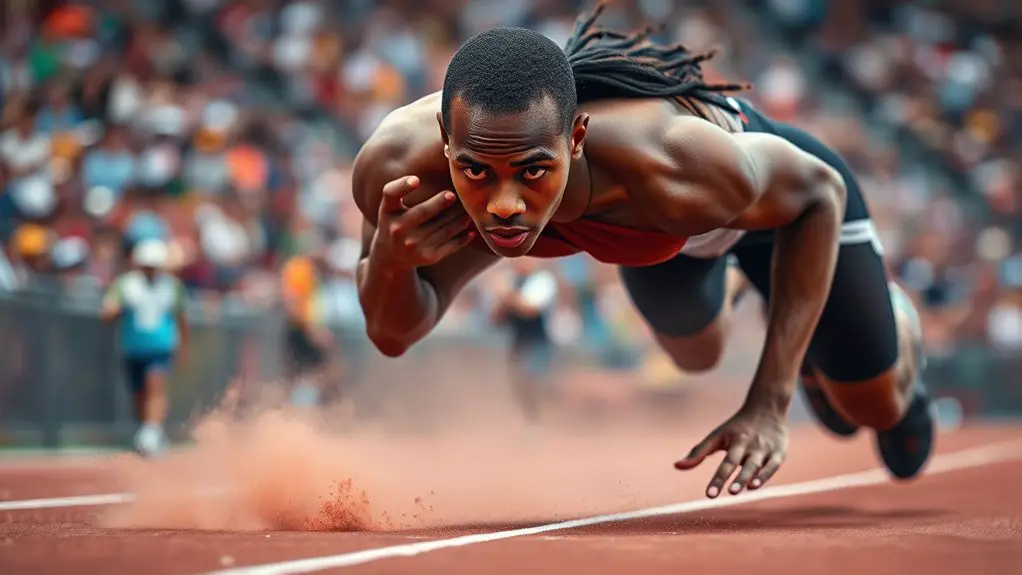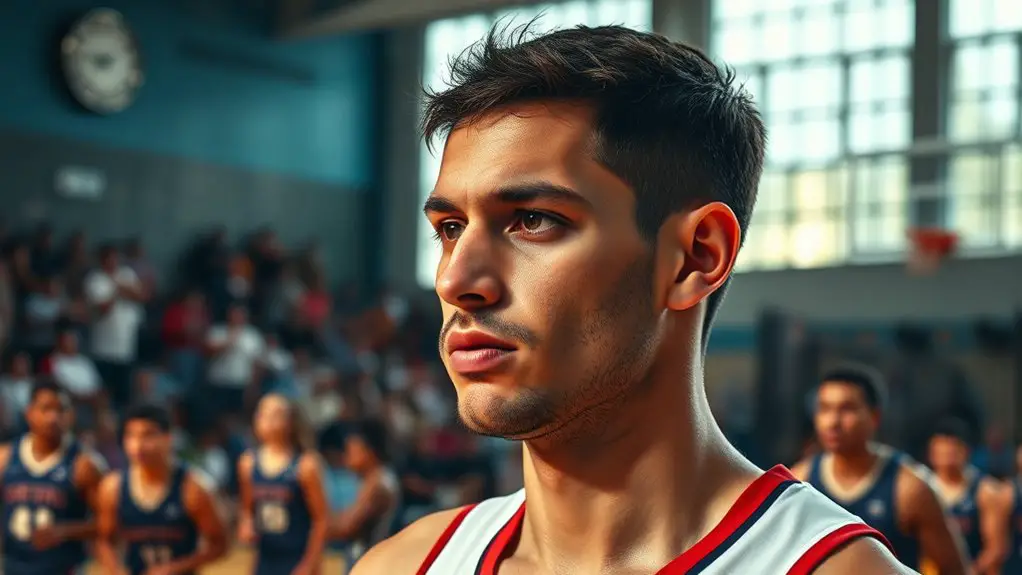Reaction speed matters in competitive sports because it often determines success or failure. Quick reactions allow you to seize opportunities, whether that's scoring in soccer or stealing a pass in basketball. Your physical fitness and mental state both play a role in how fast you react. With the right techniques and mental training, you can sharpen your reflexes. Keep following along to discover more about improving your reaction speed and its impact on athletic performance.
The Importance of Reaction Speed in Sports Performance
When it comes to competitive sports, you can't underestimate the importance of reaction speed. It's the difference between winning and losing, whether you're dodging a tackle in football or making a split-second decision on the court. Your ability to respond quickly can elevate your performance to another level, giving you that edge over your opponents.
Think about it: every moment counts. A faster reaction time allows you to seize opportunities that others might miss, leading to game-changing plays. It's not just about physical speed; it's also about mental agility. Training your mind and body to work in harmony can release your true potential.
In a world where freedom and expression matter, honing your reaction speed can empower you to play your sport authentically. So, embrace the challenge, practice diligently, and watch how your enhanced reaction speed transforms your performance on the field, court, or track.
How Reaction Speed Affects Different Sports
While each sport has its unique demands, reaction speed plays an essential role across the board. In basketball, for instance, you've gotta react quickly to steal the ball or block a shot. In soccer, that split second can mean the difference between scoring a goal or missing your chance. In combat sports, your ability to anticipate an opponent's moves can determine victory or defeat.
Even in sports like swimming, where it might seem less obvious, a fast reaction off the blocks can set the tone for the entire race. Similarly, in tennis, your response to serve or volley can shift the momentum in an instant. Practicing mindfulness improves awareness of cues during competition, allowing athletes to respond more effectively in high-stakes moments.
Key Factors Influencing Reaction Time
Several key factors influence how quickly you can react in competitive sports. First, your physical fitness plays a vital role; stronger muscles and better endurance can enhance your responsiveness. Next, your mental state is equally important; being focused and in the zone can sharpen your reflexes. Additionally, practice and familiarity with your sport can greatly improve your reaction time. The more you train, the more intuitive your responses become. Finally, environmental factors, like distractions or the pace of the game, can either hinder or enhance your reactions.
Moreover, cultivating focus in sports can help tap into your true potential and improve your overall responsiveness.
| Factor | Description |
|---|---|
| Physical Fitness | Stronger muscles lead to quicker responses |
| Mental State | Focused mindset sharpens reflexes |
| Practice | Familiarity boosts intuitive reactions |
| Environment | Distractions can slow down responses |
| Game Pace | Fast-paced situations may enhance alertness |
Understanding these factors can empower you to maximize your performance in any competitive setting.
Techniques to Improve Reaction Speed
To boost your reaction speed, you can practice specific drills designed for quick reflexes. Additionally, sharpening your mental focus can greatly enhance your response times during competition. Let's explore these techniques that can give you the edge over your opponents. Furthermore, investing in reaction time refinement through consistent practice and tailored drills is essential for serious gamers looking to improve their performance.
Drills for Quick Reflexes
Improving your reaction speed is essential in competitive sports, as even a split-second delay can affect performance. To sharpen your reflexes, try implementing specific drills into your routine. Start with the "Ball Drop" drill: have a partner drop a ball without warning, and catch it before it hits the ground. Next, practice "Shadow Sparring," where you mimic an opponent's movements, honing your ability to react quickly. Incorporate agility ladders to enhance footwork and speed. Finally, use reaction lights or apps designed to test and improve your response times. These drills not only boost your reflexes but also keep training dynamic and fun, allowing you to embrace the freedom of movement in your sport.
Mental Focus Strategies
While physical drills play a significant role in enhancing reaction speed, mental focus strategies can make a substantial difference as well. To sharpen your reaction time, start by practicing mindfulness. This'll help you stay in the moment, allowing you to react to stimuli quicker. Visualization techniques can also be powerful; picture yourself in competitive situations, responding seamlessly to challenges. Another effective method is to set clear intentions before a game or practice. This clarity can boost your concentration and reduce distractions. Finally, engage in breathing exercises to calm your mind and enhance focus. By integrating these mental strategies, you'll not only improve your reaction speed but also reveal a greater sense of freedom in your athletic performance.
The Role of Mental Training in Enhancing Reflexes
Although physical training is essential for athletes, mental training plays a crucial role in enhancing reflexes. By honing your mental skills, you can improve your ability to react swiftly and effectively in high-pressure situations. Visualization, mindfulness, and focus exercises can sharpen your reflexes, allowing you to respond to unexpected events with greater agility. Additionally, practicing mindfulness techniques can help ground you in the present moment, further improving your response time.
Here's a quick look at some mental training techniques and their benefits:
| Technique | Benefits | Application |
|---|---|---|
| Visualization | Enhances anticipation | Picture successful outcomes |
| Mindfulness | Improves focus | Stay present during competition |
| Reaction Drills | Boosts reflex speed | Practice quick decision-making |
Incorporating these techniques into your routine can reveal your potential, giving you the edge you need to excel in your sport. Don't underestimate the power of the mind—it's your ally in achieving peak performance!
Measuring Reaction Speed: Tools and Methods
When it comes to measuring reaction speed, you'll find a variety of tools and methods at your disposal. From timing systems to reaction time tests, technology plays a vital role in providing accurate measurements. Understanding these options can help you pinpoint the best approach for improving your performance.
Timing Systems Overview
As you explore the world of competitive sports, understanding how reaction speed is measured can enhance your performance. Timing systems play an essential role in capturing your response times accurately. Modern technology, like electronic timing gates and pressure sensors, provides real-time data that helps you gauge your improvements. These systems often use lasers or pads that detect movement, ensuring precision in your measurements. Additionally, wearable devices can track your reaction speed by monitoring your physical responses during training and competitions. By leveraging these tools, you can pinpoint areas for growth and refine your skills. Embracing these advancements gives you the freedom to push your limits and achieve your personal best in any sport.
Reaction Time Tests
With timing systems providing accurate measurements, it's important to understand how reaction time tests can further help you evaluate your performance. These tests are essential for gauging your ability to respond quickly under pressure, which is vital in competitive sports. Simple methods like the ruler drop test or more advanced setups using light signals can provide insights into your reaction speed. You can easily perform these tests at home or in a training facility, allowing you to track your progress over time. By regularly evaluating your reaction time, you can identify areas for improvement and adapt your training accordingly. Embracing these tests empowers you to enhance your performance and ultimately gain the edge you need to succeed in your sport.
Technology in Measurement
While traditional methods for measuring reaction speed have their merits, advanced technology has revolutionized the way athletes assess their performance. You don't have to rely solely on stopwatches anymore; modern tools provide precise insights into your reaction times.
Consider these innovative options:
- Electronic Timing Systems: These offer accuracy down to the millisecond, giving you the best data possible.
- Wearable Devices: Smartwatches and fitness trackers monitor your reaction speed during training in real-time.
- Reaction Training Apps: Interactive apps provide drills and instant feedback to improve your speed.
- High-Speed Cameras: Capture your movements and analyze them frame-by-frame for detailed performance insights.
Embracing these technologies can give you the edge you need in competitive sports.
Case Studies: Athletes Who Excelled Due to Fast Reactions
Fast reactions can be the difference between victory and defeat in competitive sports, and several athletes have showcased this extraordinary ability. Think of Usain Bolt, who's not just fast but reacts to the starting gun with lightning speed. Or consider Serena Williams, whose quick reflexes let her dominate the tennis court, returning serves that seem impossible. These athletes remind us that every millisecond counts. Developing mental toughness enables athletes to maintain composure and make split-second decisions under pressure.
| Athlete | Sport | Reaction Time (ms) |
|---|---|---|
| Usain Bolt | Sprinting | 165 |
| Serena Williams | Tennis | 200 |
| Lionel Messi | Soccer | 150 |
| Michael Phelps | Swimming | 180 |
| LeBron James | Basketball | 210 |
Their incredible reaction times illustrate how freedom in movement and split-second decisions can seize glory. It's a reminder that in sports, as in life, seizing the moment is everything.
Frequently Asked Questions
How Does Age Affect Reaction Speed in Athletes?
As you age, your reaction speed may slow due to changes in muscle strength, coordination, and cognitive processing. Staying active and training can help mitigate these effects, allowing you to maintain better performance longer.
Are There Specific Diets That Enhance Reaction Time?
Certain diets rich in antioxidants, omega-3 fatty acids, and complex carbohydrates can enhance your reaction time. Foods like berries, fish, and whole grains support brain health, keeping you sharp and quick on your feet.
What Role Does Sleep Play in Reaction Speed?
Imagine drifting into a deep, restful sleep, where your mind refreshes like a calm lake at dawn. Without proper sleep, your reaction speed slows, leaving you less agile and alert when it matters most.
Can Technology Aid in Training Reaction Speed?
Absolutely, technology can enhance your reaction speed training. Wearable devices, apps, and virtual reality simulations provide real-time feedback and drills, helping you sharpen your reflexes and decision-making skills more efficiently than traditional methods ever could.
How Does Injury Impact an Athlete's Reaction Time?
Injuries can shatter your rhythm, like a sudden storm disrupting a clear sky. They slow your reflexes, making you second-guess movements and robbing you of that exhilarating freedom, essential for peak performance in your sport.




